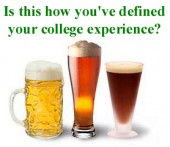How to Address College Drinking
I was reading a study that basically was saying that partying isn’t a requirement for happiness in college. My first thought: well sure it’s not essential, but it was definitely a huge part of my college lifestyle and I thought I was happy because of it. It made me feel like a belonged, had confidence, and could let go of all stress from life when I drank. Fortunately I have learned in recovery that it was really all a rouge, and mask to real self confidence and having choices in this world.
Normalcy of Binge Drinking in College
I can honestly say I knew of no one who remained sober in college. I remember binge drinking being normal, and light drinking to be pointless. There was always an endless amount of alcohol, and running out was never an issue. Think about that really for a minute. I was underage a majority of my college years, and access to free alcohol was plentiful. I never had to buy a drink, could show up at random parties, and drink. I am not sure about all colleges, but can probably guess if you asked any person who attended, that access to alcohol was never an issue.
I don’t even think access is necessarily the issue with college students and drinking behaviors. I think the problem surrounds the normalcy, as well as the expectation that drinking is a part of all social events in college. It is used as a celebration, bonding experience. My mom was talking to me recently about my drinking in college, and as much as I didn’t think they knew everything, she did address her concern that originally in the beginning of my college career, drinking would be limited to the weekends, and over the four years, it became a ritual even on Wednesdays and Thursdays. So much for thinking I had hidden my behaviors well. I always said alcohol is truth serum.
When I was in college I definitely intended to get drunk when drinking, there was no reason to drink responsibly. It was all about lowering inhibitions, feeling like you belong, letting go, and having fun not caring about the consequences while drinking.
Alcohol Awareness Not Changing College Students Drinking Behavior
E. Scott Geller, a psychologist and director at the Center for Applied Behavior Systems at Virginia Tech has studied and has said that alcohol awareness and education hasn’t had an impact in changing behavior.
“We thought if we could demonstrate to students that their performance deteriorated under alcohol, they would be convinced that their alcohol consumption has put them at risk, but even knowing that one is impaired, physically and even emotionally, it did not seem to reduce alcohol consumption. It actually encouraged them to drink more,” Geller says.
I know that consequences and hearing about being impaired did not change my behavior at all. There was a girl in our dorms, whom I had hung out with once, who ended up dying from an overdose of alcohol and drugs, and while it was sad and shocking, it didn’t have any impact in changing my behavior. Drinking alcohol gives college students the courage, I am sure many of you have heard the phrase “liquid courage,” to act on desires, and have an excuse for any bad behavior.
Drinking Benefits Outweigh All Negatives for College Students
My experience has been supported by other studies, including one that says that drinking benefits outweigh all the negatives. Maybe we need to hear more about how you don’t need to drink to be happy. People who are less social tend to be happier because they rely more on social connections (with friends and family) and cognitive strategies versus going out to drink and party.
We Need a New Approach to Address College Drinking
If alcohol awareness doesn’t work, if hearing about the dangers of being sexually assaulted, overdosing, blacking out, getting alcohol poisoning, do not change nor influence college students behavior, what will?? It seems if alcohol awareness programs are not working, that there needs to be a new approach and activism. Why do we continue to spend a lot of money on social programs that don’t work? How do we address the concerns of college binge drinking and substance abuse if not through awareness?
I am interested in this new happiness research, because it was a survey that included a Satisfaction with Life Scale, Positive/Negative Affect Scale, and a 44-item Survey of Happiness Strategies. Psychologist Dr. Bernardo J. Carducci, the researcher of the study at Indiana University Southeast, says “with this measure, you can look at people who are low (on the scale) and realize you need to keep an eye out on them. They might need help learning how to develop goals. They might need help learning how to delay instant gratification.”
I think college students need to see they can have a life, have fun, be happy, all without drinking. We need to not only focus on the negative outcomes from the drinking, but the positives of not drinking. We need to teach college students problem solving, emotional regulation, stress management, etc. I think we have to de-normalize this behavior as a rite of passage, and begin addressing these concerns and helping the students who may be struggling with substance abuse.
APA Reference
Sebelius, K.
(2011, September 1). How to Address College Drinking, HealthyPlace. Retrieved
on 2026, March 3 from https://www.healthyplace.com/blogs/debunkingaddiction/2011/09/how-to-address-college-drinking